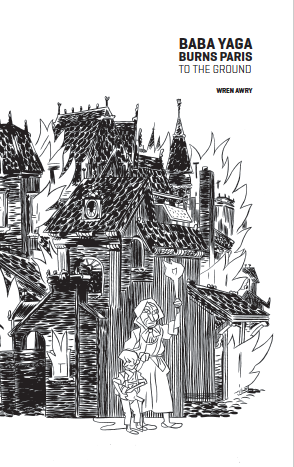 Baba Yaga Burns Paris to the Ground
Baba Yaga Burns Paris to the Ground
Wren Awry, 18 pgs, Strangers in a Tangled Wilderness, tangledwilderness.org, free online
“Not genre-specific” is a phrase I come across increasingly and one way to define Wren Awry’s zine. Is it a historical essay? A fairy tale? A short story? Creative non-fiction? A multivalent piece of prose-writing, Baba Yaga Burns Paris to the Ground knits all these elements and more into a cohesive structure, bringing page-after-page of surprises with the unexpected logic of its argument.
The central figure is that of the “pétroleuse,” a semi-historical figment of the Paris Commune of 1871; an iteration of woman as social disturbance, the pétroleuse postures as incendiary. For Awry then, the pétroleuse stands “at a crossroads between the witch-hunts of early Modern Europe, the literary traditions of European fairy tales, and histories of resistance to capitalism and the State.” As such, they range from nineteenth-century French cartoons to Charles Perrault’s grotesque fairy tales to writing a short, prose-poem-like fairy tale of their own.
In terms of fairy tales, Awry clearly knows what they’re talking about, alluding to lesser-known variants of popular stories and inter-cultural folkloric retellings – the Brothers Grimm’s “Fitcher’s Bird,” for example, is an evocative version of the famous “Bluebeard.” Their arguments, however, is hypothesis rather than fact – did Gustave Doré’s illustrations of hags in fairy tales really help construct the pétroleuse as social phenomenon? If this were an academic essay, it would require more rigorous research. As creative writing, it is intelligent and fun. As Awry admits: “The industrial revolution and three-thousand odd miles stand between Baba Yaga and the pétroleuses.” (Klara du Plessis)
